Gloria Vanderbilt, the intrepid heiress, artist and romantic who began her extraordinary life as the "poor little rich girl" of the Great Depression, survived family tragedy and multiple marriages and reigned during the 1970s and '80s as a designer jeans pioneer, died Monday at the age of 95.
Vanderbilt, the great-great-granddaughter of financier Cornelius Vanderbilt and the mother of CNN newsman Anderson Cooper, who announced her death via a first-person obituary that aired on the network Monday morning.
Cooper confirmed said Vanderbilt died at home with friends and family at her side. She had been suffering from advanced stomach cancer, he noted.
"Gloria Vanderbilt was an extraordinary woman, who loved life, and lived it on her own terms," Cooper said in a statement. "She was a painter, a writer, and designer but also a remarkable mother, wife, and friend. She was 95 years old, but ask anyone close to her, and they'd tell you, she was the youngest person they knew, the coolest, and most modern."
Her life was chronicled in sensational headlines from her childhood through four marriages and three divorces. She married for the first time at 17, causing her aunt to disinherit her. Her husbands included Leopold Stokowski, the celebrated conductor, and Sidney Lumet, the award-winning movie and television director. In 1988, she witnessed the suicide of one of her four sons.
Vanderbilt was a talented painter and collagist who also acted on the stage ("The Time of Your Life" on Broadway) and television ("Playhouse 90," ''Studio One," ''Kraft Theater," ''U.S. Steel Hour"). She was a fabric designer who became an early enthusiast for designer denim. The dark-haired, tall and ultra-thin Vanderbilt partnered with Mohan Murjani, who introduced a $1 million advertising campaign in 1978 that turned the Gloria Vanderbilt brand with its signature white swan label into a sensation.
At its peak in 1980, it was generating over $200 million in sales. And decades later, famous-name designer jeans — dressed up or down — remain a woman's wardrobe staple.
Vanderbilt wrote several books, including the 2004 chronicle of her love life: "It Seemed Important at the Time: A Romance Memoir," which drops such names as Errol Flynn, whom she dated as a teenager; Frank Sinatra, for whom she left Stokowski; Marlon Brando and Howard Hughes.
She claimed her only happy marriage was to author Wyatt Cooper, which ended with his death in 1978 at age 50. Son Anderson Cooper called her memoir "a terrific book; it's like an older 'Sex and the City.'"
"I've had many, many loves," Vanderbilt told The Associated Press in a 2004 interview. "I always feel that something wonderful is going to happen. And it always does."
Noting her father's death when she was a toddler, she said: "If you don't have a father, you don't miss it, because you don't know what it is. It was really only when I married Wyatt Cooper that I understood what it was like to have a father, because he was just an extraordinary father."
In 2016, Vanderbilt and Anderson Cooper appeared together in the HBO documentary "Nothing Left Unsaid."
Gloria Laura Madeleine Sophie Vanderbilt was born in 1924, a century after her great-great-grandfather started the family fortune, first in steamships, later in railroads. He left around $100 million when he died in 1877 at age 82.
Her father, Reginald Claypoole Vanderbilt, was 43, a gambler and boozer dying of liver disease when he married Gloria Morgan, 19, in 1923. Their daughter was 1 when Vanderbilt died in 1925, having gone through $25 million in 14 years.
Beneficiary of a $5 million trust fund, Vanderbilt became the "poor little rich girl" in 1934 at age 10 as the object of a custody fight between her globe-trotting mother and matriarchal aunt.
The aunt, Gertrude Vanderbilt Whitney, 59, who controlled $78 million and founded the Whitney Museum of American Art, won custody of her niece.
A shocked judge had closed the trial when a maid accused the child's mother of a lesbian affair with a member of the British royal family. The fight was chronicled in the best-selling 1980 book "Little Gloria ... Happy at Last," made into a TV miniseries in 1982 with Angela Lansbury playing Whitney.
After spending the next seven years on her aunt's Long Island estate, Vanderbilt went to Hollywood. She dated celebrities and declared she would marry Hughes. Instead, the 17-year-old wed Hughes' press agent, Pasquale di Cicco, prompting her aunt to cut Gloria out of her will.
Vanderbilt came into her own $5 million trust fund in 1945 at age 21. She also divorced Di Cicco, whom she said had beaten her often, and the next day married the 63-year-old Stokowski. The marriage to the conductor lasted 10 years and produced two sons, Stanislaus and Christopher.
After her marriage broke up, Vanderbilt found herself embroiled in another custody case, this time as the mother. During the closed hearings, Stokowski accused Vanderbilt of spending too much time at parties and too little with the boys. She accused him of tyrannizing his sons and said he really was 85, and not 72 as he claimed.
Justice Edgar Nathan Jr. gave Vanderbilt full-time custody. But he commented that the court had wasted a month on "the resolution of problems which mature, intelligent parents should be able to work out for themselves."
Vanderbilt married Lumet in 1956 and lived with him and her children in a 10-room duplex penthouse on Gracie Square. She divorced Lumet and married Cooper in 1963.
Their elder son, Carter, a Princeton graduate and editor at American Heritage, killed himself in 1988 at age 23, leaping from his mother's 14th floor apartment as she tried to stop him. Police said he had been treated for depression and friends said he was despondent over a break-up with a girlfriend.
After her success in designer jeans, Vanderbilt branched out into other areas, including shoes, scarves, table and bed linens, and china, through her company, Gloria Concepts. In 1988 Vanderbilt joined the designer fragrance market with her signature "Glorious."
By the late 1980s, Vanderbilt sold the name and licenses for the brand name "Gloria Vanderbilt" to Gitano, who transferred it to a group of private investors in 1993. More recently, her stretch jeans have been licensed through Jones Apparel Group Inc., which acquired Gloria Vanderbilt Apparel Corp. in 2002 for $138 million.
Vanderbilt became the target of a swindle in the late 1970s and early '80s when she made her psychiatrist and a lawyer associates in her business affairs. A court held that the two had looted millions from Vanderbilt's bank accounts.
Vanderbilt also made headlines in 1980 when she filed, but later dropped, a discrimination complaint against the posh River House apartments, which had rejected her bid to buy a $1.1 million duplex. She claimed the board was worried that black singer Bobby Short, who appeared with her on TV commercials, might marry her.
In 2009, the 85-year-old Vanderbilt penned a new novel, "Obsession: An Erotic Tale," a graphic tale about an architect's widow who discovers a cache of her husband's letters that reveal his secret sex life.
In an interview with The New York Times, she said she wasn't embarrassed about the explicitness of her new book, saying: "I don't think age has anything to do with what you write about. The only thing that would embarrass me is bad writing, and the only thing that really concerned me was my children. You know how children can be about their parents. But mine are very intelligent and supportive."
VENICE, Italy (AP) — Under the gaze of the world’s media, the fragile lagoon city of Venice launched a pilot program Thursday to charge day-trippers a 5-euro (around $5.35) entry fee that authorities hope will discourage visitors from arriving on peak days and make the city more livable for its dwindling residents.
Visitors arriving at Venice's main train station were greeted with large signs listing the 29 dates through July of the plan's test phase, as well as new entrances separating tourists from residents, students and workers.
Stewards were on hand to politely guide anyone unaware of the new requirements through the process of downloading the QR code to pay the fee.
“We need to find a new balance between the tourists and residents,’’ said the city’s top tourism official, Simone Venturini. “We need to safeguard the spaces of the residents, of course, and we need to discourage the arrival of day-trippers on some particular days.”
Arianna Cecilia, who lives in Rome and was visiting Venice for the first time with her boyfriend, said it felt “strange" to have to buy a ticket to enter a city in her native Italy, and then pass through a tourist entrance.
The couple were staying in nearby Treviso, and had paid the fee and downloaded the QR code as required prior to arrival.
Workers in yellow vests carried out random checks at the train station, and anyone caught faces fines of 50 euros to 300 euros — though officials said “common sense” was being applied for the launch.
The requirement applies only for people arriving between 8:30 a.m. and 4 p.m. Outside of those hours, access is free and unchecked.
Venice has long suffered under the pressure of over-tourism, and officials hope the pilot project can help provide more exact figures to better manage the phenomenon.
The city can track the number of hotel visitors — which last year numbered 4.6 million, down 16% from pre-pandemic highs. But the number of day visitors, which make up the majority of the crowds in Venice, could only be estimated until recently.
A Smart Control Room set up during the pandemic has been tracking arrivals from cell phone data, roughly confirming pre-pandemic estimates of 25 million to 30 million arrivals a year, said Michele Zuin, the city’s top economic official. That includes both day-trippers and overnight guests.
But Zuin said the data is incomplete. “It’s clear we will get more reliable data from the contribution” being paid by day-trippers, he said.
Venturini said the city is strained when the number of day-trippers reaches 30,000 to 40,000. Its narrow alleyways are clogged with people and water taxis packed, making it difficult for residents to go about their business.
Not all residents, however, are persuaded of the efficacy of the new system in dissuading mass tourism. Some say more attention needs to be paid to boosting the resident population and services they need.
Venice last year passed a telling milestone when the number of tourist beds exceeded for the first time the number of official residents, which is now below 50,000 in the historic center with its picturesque canals.
“Putting a ticket to enter a city will not decrease not even by one single unit the number of visitors that are coming,’’ said Tommaso Cacciari, an activist who organized a protest Thursday against the measure.
“You pay a ticket to take the metro, to go to a museum, an amusement park; you don’t pay a ticket to enter a city. This is the last symbolic step of a project of an idea of this municipal administration to kick residents out of Venice,” he said.
Venturini said about 6,000 people had already paid to download the QR code, and officials expect paid day-tripper arrivals Thursday to reach some 10,000.
More than 70,000 others have downloaded a QR code denoting an exemption, including to work in Venice or as a resident of the Veneto region. People staying in hotels in Venice, including in mainland districts like Marghera or Mestre, should get a QR code attesting to their stay, which includes a hotel tax.
The tourist official says interest in Venice's pilot program has been keen from other places suffering from mass tourism, including other Italian art cities and cities abroad such as Barcelona and Amsterdam.
Marina Rodino, who has lived in Venice for 30 years, is opposed to the new plan. She was passing out mock EU passports for “Venice, Open City,” underlining the irony of the new system, and challenging its legal standing with citations from the Italian constitution guaranteeing its citizens the right to “move or reside freely in any part of the national territory."
Rodino has seen her local butcher close and families leave her neighborhood near the famed Rialto Bridge as short-term apartment rentals spring up. But she said the new entrance fee requirement will still allow young people to flood the city in the evening for often rowdy gatherings.
“This is not a natural oasis. This is not a museum. It is not Pompeii," she said. “It is a city, where we need to fight so the houses are inhabited by families, and stores reopen. That is what would counter this wild tourism.”
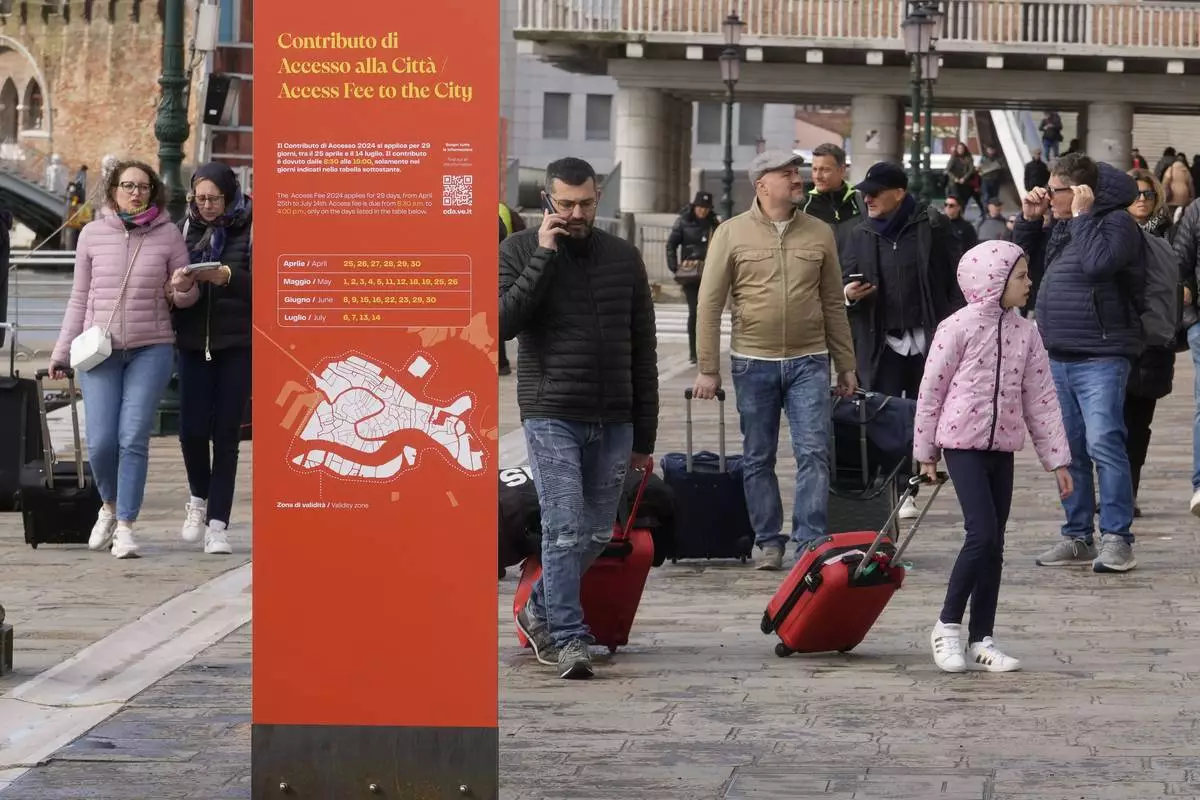
Tourists arrive in Venice, Italy, Thursday, April 25, 2024. The fragile lagoon city of Venice begins a pilot program Thursday to charge daytrippers a 5 euro entry fee that authorities hope will discourage tourists from arriving on peak days. The daytripper tax is being tested on 29 days through July, mostly weekends and holidays starting with Italy's Liberation Day holiday Thursday. Officials expect some 10,000 people will pay the fee to access the city on the first day, downloading a QR code to prove their payment, while another 70,000 will receive exceptions, for example, because they work in Venice or live in the Veneto region. (AP Photo/Luca Bruno)
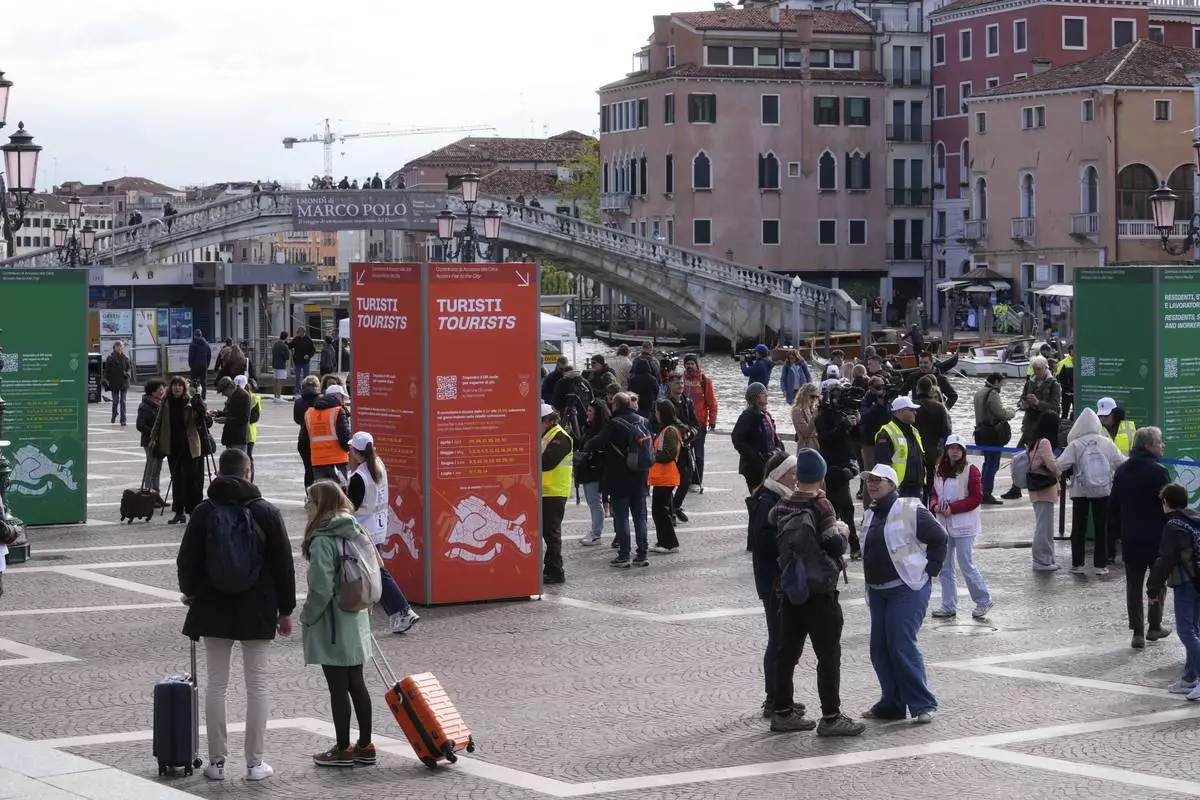
Stewards check tourists QR code access outside the main train station in Venice, Italy, Thursday, April 25, 2024. The fragile lagoon city of Venice begins a pilot program Thursday to charge daytrippers a 5 euro entry fee that authorities hope will discourage tourists from arriving on peak days. The daytripper tax is being tested on 29 days through July, mostly weekends and holidays starting with Italy's Liberation Day holiday Thursday. Officials expect some 10,000 people will pay the fee to access the city on the first day, downloading a QR code to prove their payment, while another 70,000 will receive exceptions, for example, because they work in Venice or live in the Veneto region. (AP Photo/Luca Bruno)
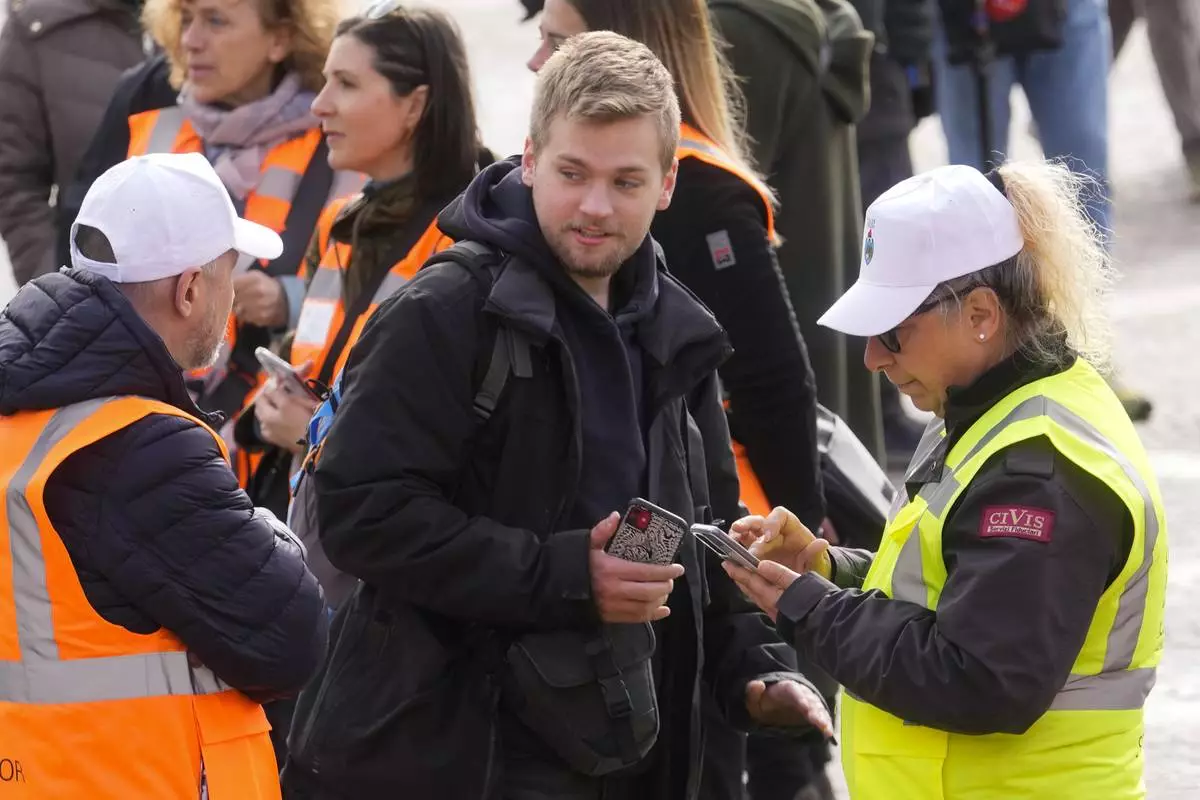
Stewards check a tourist QR code access outside the main train station in Venice, Italy, Thursday, April 25, 2024. The fragile lagoon city of Venice begins a pilot program Thursday to charge daytrippers a 5 euro entry fee that authorities hope will discourage tourists from arriving on peak days. The daytripper tax is being tested on 29 days through July, mostly weekends and holidays starting with Italy's Liberation Day holiday Thursday. Officials expect some 10,000 people will pay the fee to access the city on the first day, downloading a QR code to prove their payment, while another 70,000 will receive exceptions, for example, because they work in Venice or live in the Veneto region. (AP Photo/Luca Bruno)
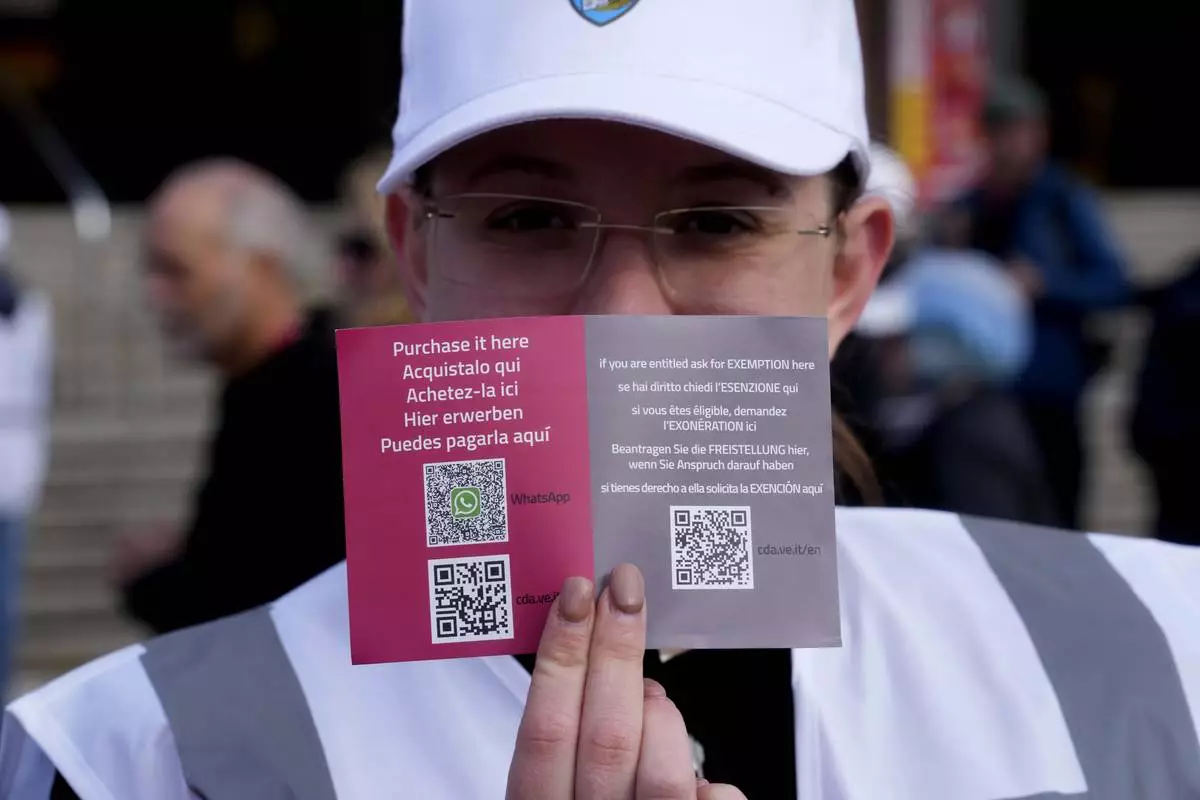
A steward shows the QR code access outside the main train station in Venice, Italy, Thursday, April 25, 2024. The fragile lagoon city of Venice begins a pilot program Thursday to charge daytrippers a 5 euro entry fee that authorities hope will discourage tourists from arriving on peak days. The daytripper tax is being tested on 29 days through July, mostly weekends and holidays starting with Italy's Liberation Day holiday Thursday. Officials expect some 10,000 people will pay the fee to access the city on the first day, downloading a QR code to prove their payment, while another 70,000 will receive exceptions, for example, because they work in Venice or live in the Veneto region. (AP Photo/Luca Bruno)
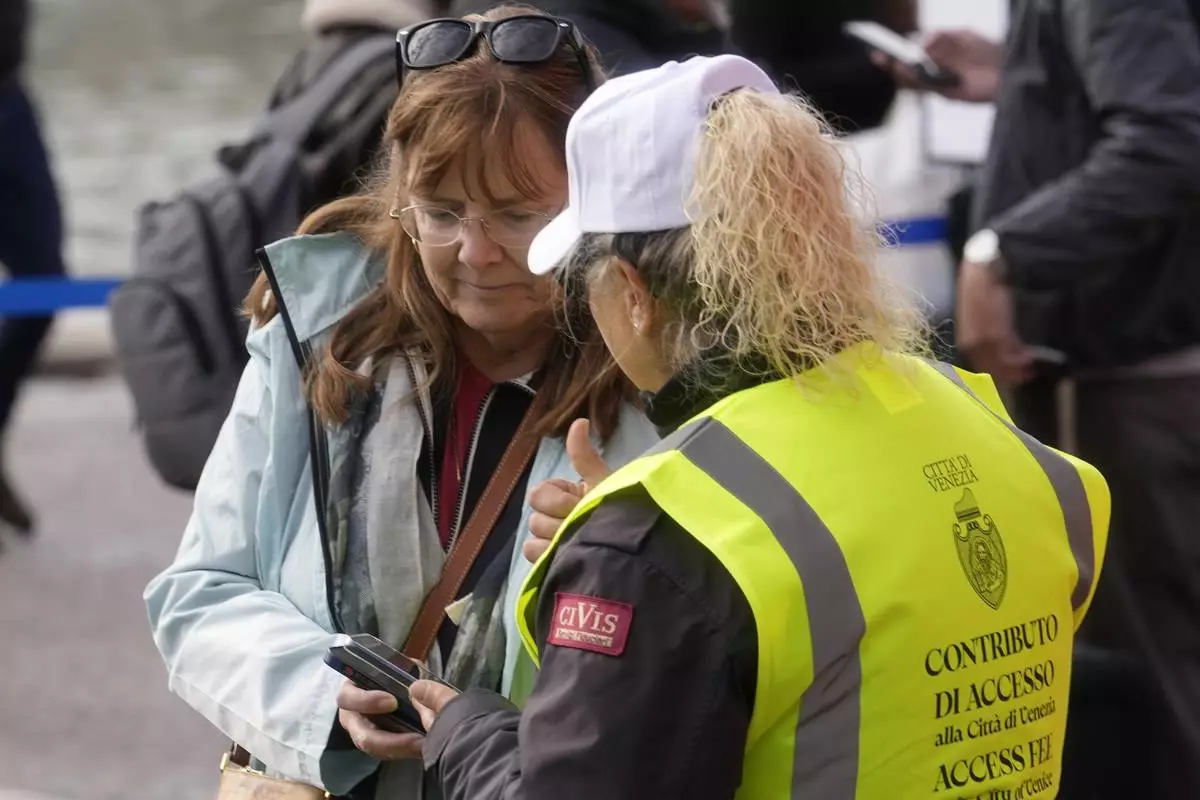
A steward checks a tourist QR code access outside the main train station in Venice, Italy, Thursday, April 25, 2024. The fragile lagoon city of Venice begins a pilot program Thursday to charge daytrippers a 5 euro entry fee that authorities hope will discourage tourists from arriving on peak days. The daytripper tax is being tested on 29 days through July, mostly weekends and holidays starting with Italy's Liberation Day holiday Thursday. Officials expect some 10,000 people will pay the fee to access the city on the first day, downloading a QR code to prove their payment, while another 70,000 will receive exceptions, for example, because they work in Venice or live in the Veneto region. (AP Photo/Luca Bruno)
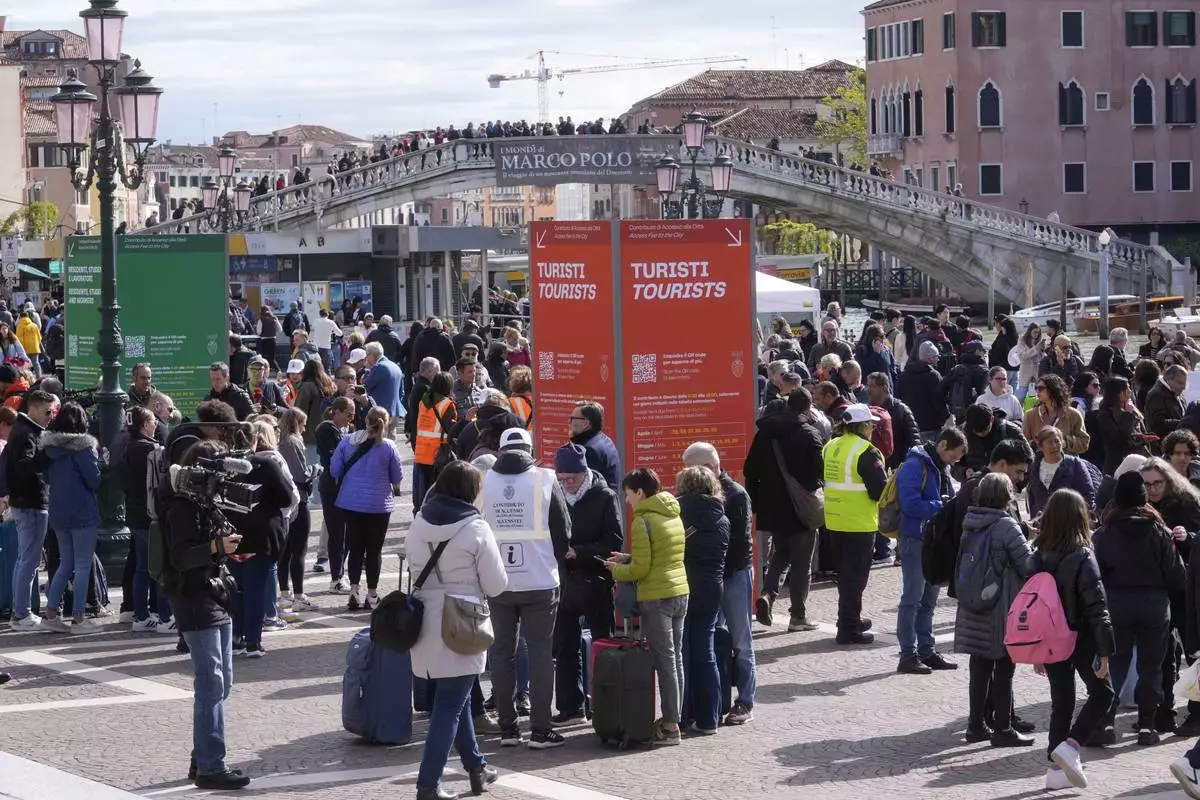
Stewards check tourists QR code access outside the main train station in Venice, Italy, Thursday, April 25, 2024. The fragile lagoon city of Venice begins a pilot program Thursday to charge daytrippers a 5 euro entry fee that authorities hope will discourage tourists from arriving on peak days. The daytripper tax is being tested on 29 days through July, mostly weekends and holidays starting with Italy's Liberation Day holiday Thursday. Officials expect some 10,000 people will pay the fee to access the city on the first day, downloading a QR code to prove their payment, while another 70,000 will receive exceptions, for example, because they work in Venice or live in the Veneto region. (AP Photo/Luca Bruno)
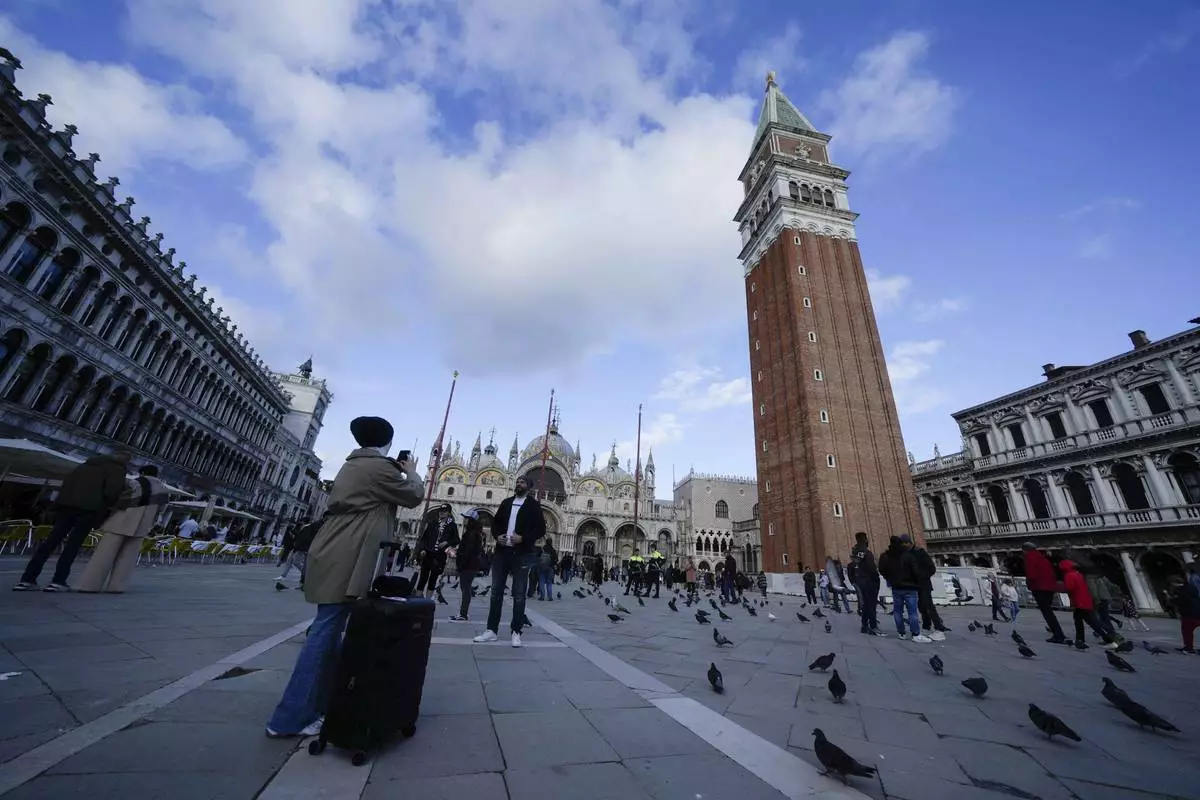
Tourists take pictures at the St. Mark square in Venice, Italy, Wednesday, April 24, 2024. The lagoon city of Venice begins a pilot program Thursday, April 25, 2024 to charge daytrippers a 5 euro entry fee that authorities hope will discourage tourists from arriving on peak days. Officials expect some 10,000 people will pay the fee to access the city on the first day, downloading a QR code to prove their payment. (AP Photo/Luca Bruno)
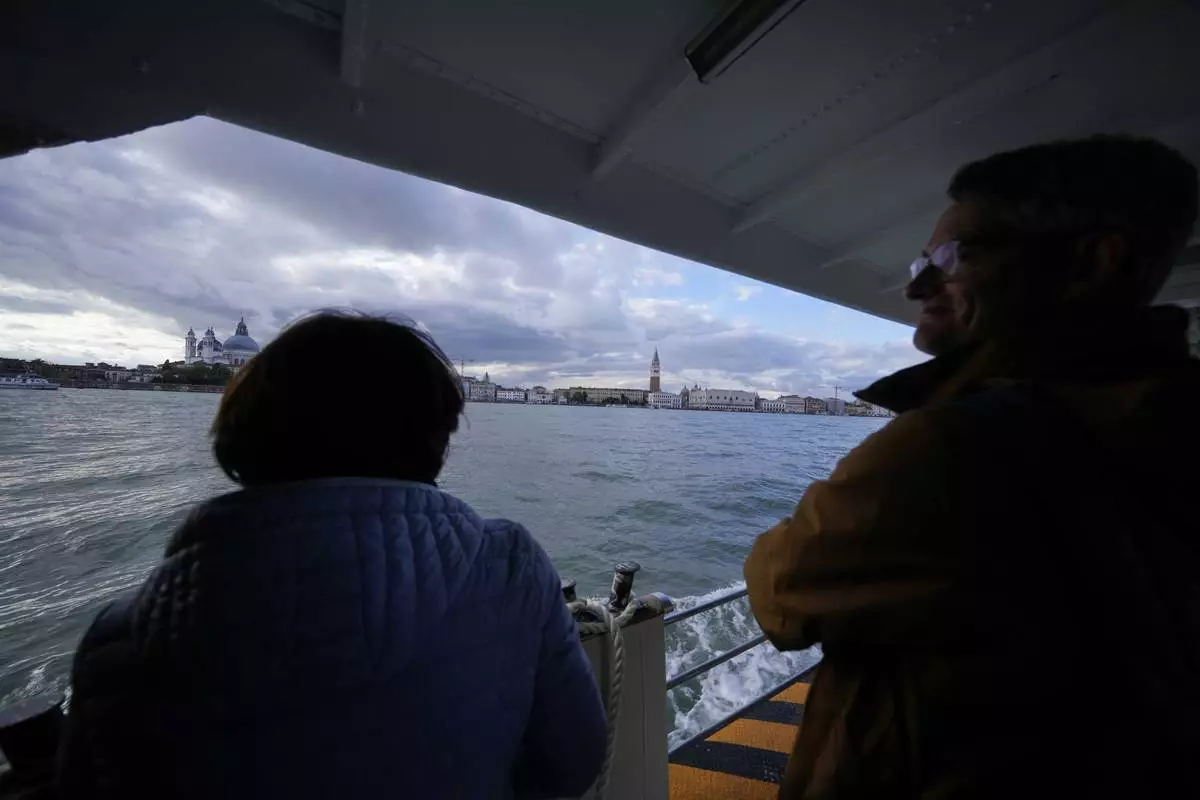
Tourists ride on a ferry boat in Venice, Italy, Wednesday, April 24, 2024. The lagoon city of Venice begins a pilot program Thursday, April 25, 2024 to charge daytrippers a 5 euro entry fee that authorities hope will discourage tourists from arriving on peak days. Officials expect some 10,000 people will pay the fee to access the city on the first day, downloading a QR code to prove their payment. (AP Photo/Luca Bruno)
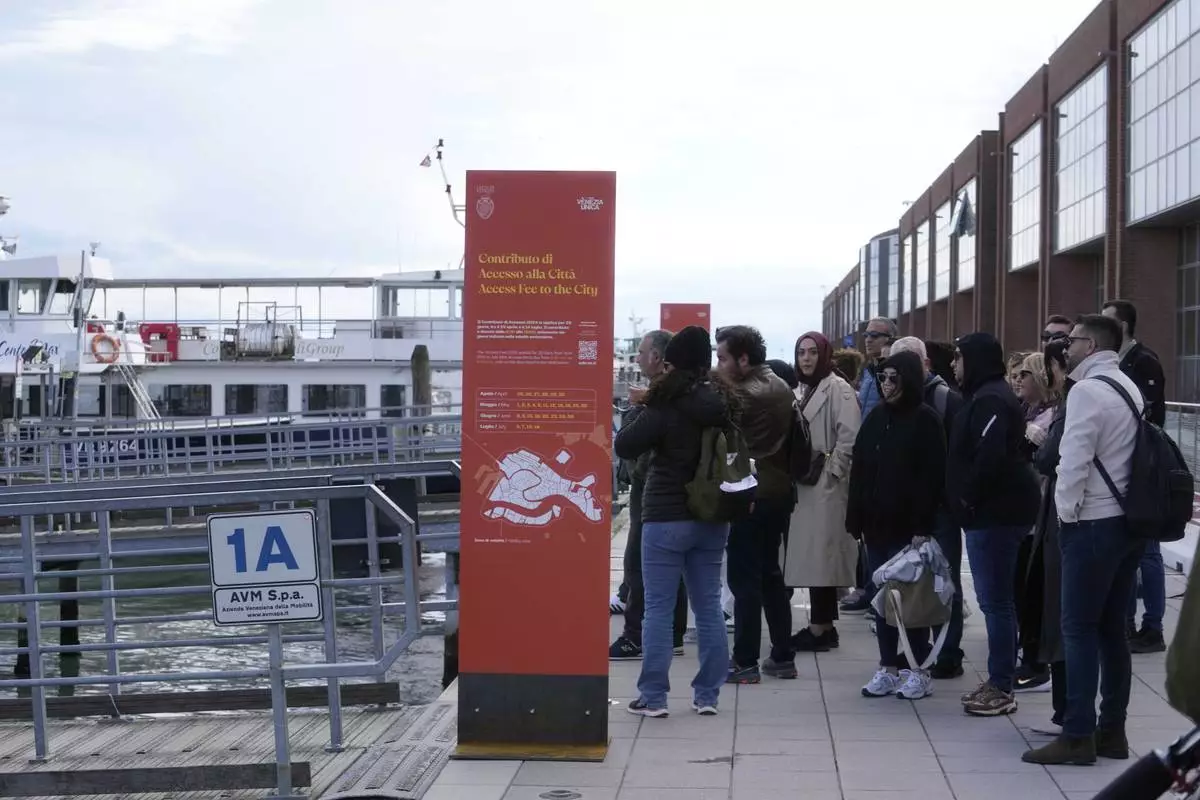
People stand in front of an information board explaining how to pay the tourist tax in Venice, Italy, Wednesday, April 24, 2024. The lagoon city of Venice begins a pilot program Thursday, April 25, 2024 to charge daytrippers a 5 euro entry fee that authorities hope will discourage tourists from arriving on peak days. Officials expect some 10,000 people will pay the fee to access the city on the first day, downloading a QR code to prove their payment. (AP Photo/Luca Bruno)

Marco Bettini, director of Venis Informatics System, gestures as he talks to reporters at the police Venice control room, in Venice, Italy, Wednesday, April 24, 2024. The lagoon city of Venice begins a pilot program Thursday, April 25, 2024 to charge daytrippers a 5 euro entry fee that authorities hope will discourage tourists from arriving on peak days. Officials expect some 10,000 people will pay the fee to access the city on the first day, downloading a QR code to prove their payment. (AP Photo/Luca Bruno)
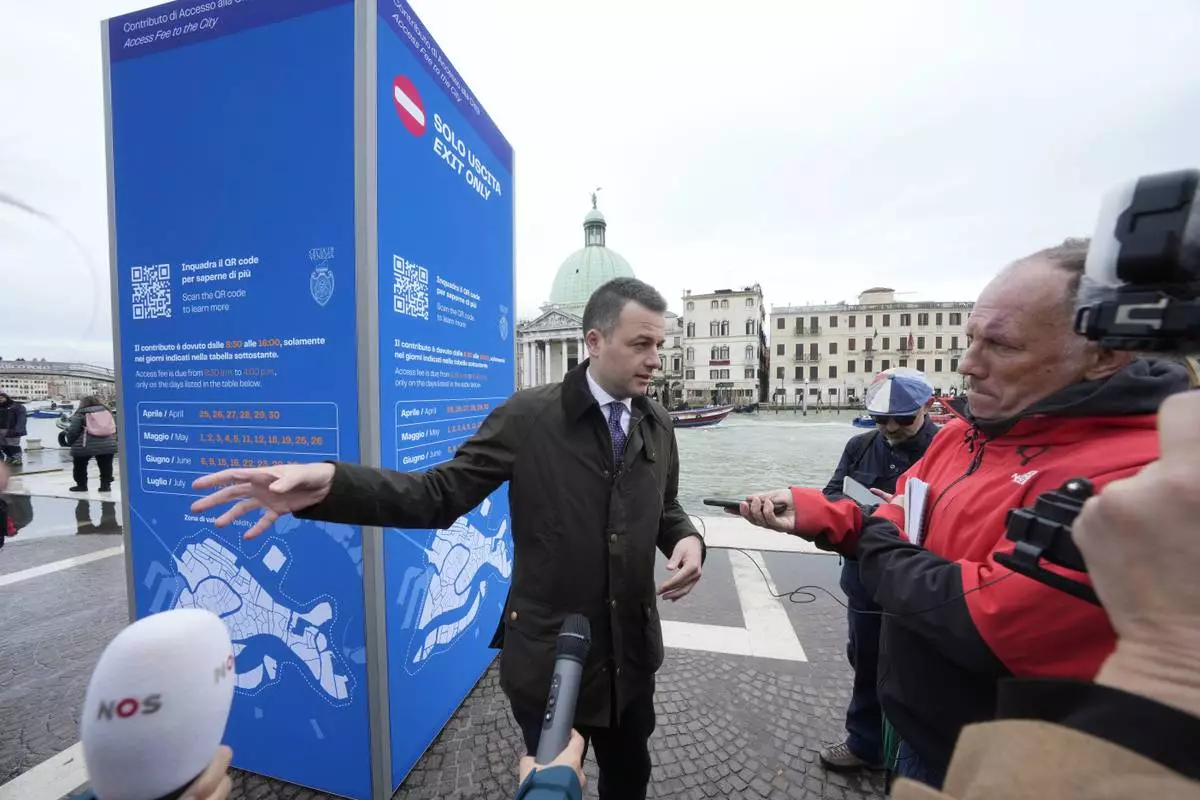
Venice councillor Simone Venturini speaks with reporters in front of a tourist tax totem in Venice, Italy, Wednesday, April 24, 2024. The lagoon city of Venice begins a pilot program Thursday, April 25, 2024 to charge daytrippers a 5 euro entry fee that authorities hope will discourage tourists from arriving on peak days. Officials expect some 10,000 people will pay the fee to access the city on the first day, downloading a QR code to prove their payment. (AP Photo/Luca Bruno)
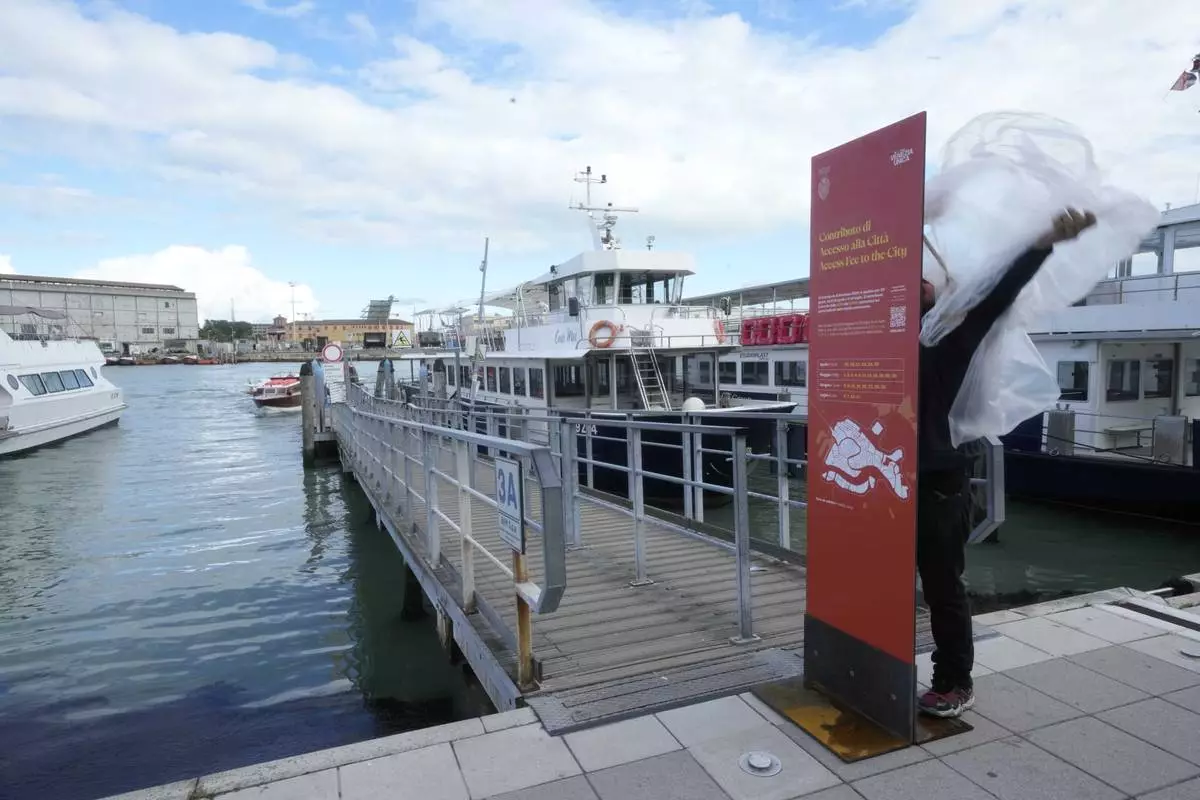
Workers prepare banner explaining how to pay the tourist tax in Venice, Italy, Wednesday, April 24, 2024. The lagoon city of Venice begins a pilot program Thursday, April 25, 2024 to charge daytrippers a 5 euro entry fee that authorities hope will discourage tourists from arriving on peak days. Officials expect some 10,000 people will pay the fee to access the city on the first day, downloading a QR code to prove their payment. (AP Photo/Luca Bruno)
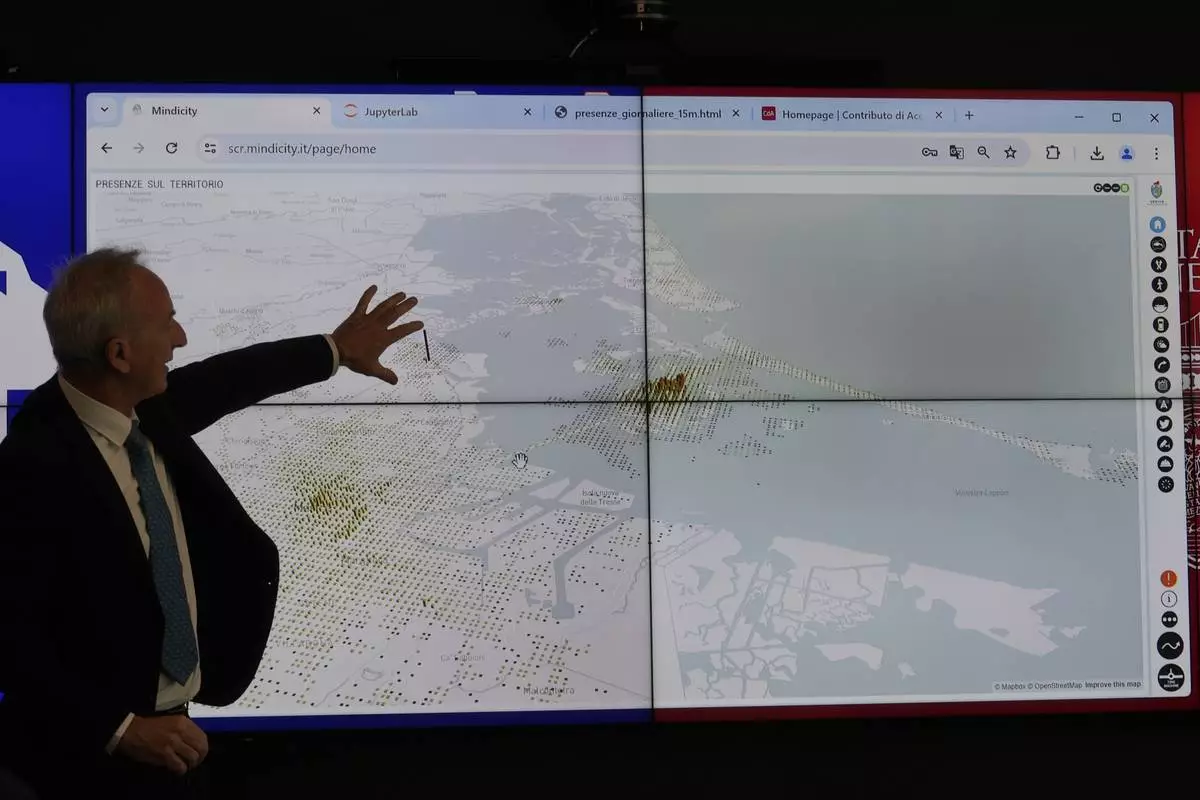
Marco Bettini, director of Venis Informatics System, gestures as he explains the Venice density to reporters at the police Venice control room in Venice, Italy, Wednesday, April 24, 2024. The lagoon city of Venice begins a pilot program Thursday, April 25, 2024 to charge daytrippers a 5 euro entry fee that authorities hope will discourage tourists from arriving on peak days. Officials expect some 10,000 people will pay the fee to access the city on the first day, downloading a QR code to prove their payment. (AP Photo/Luca Bruno)
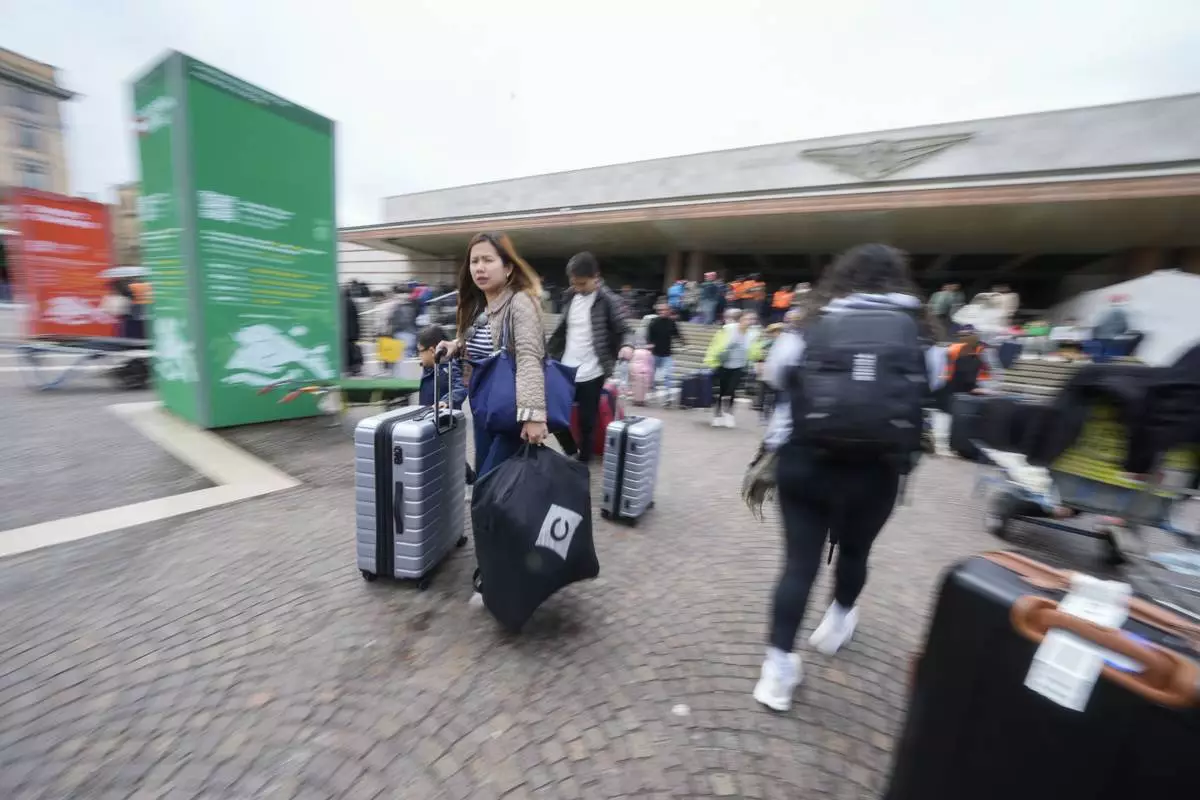
Tourists arrive at the main train station in Venice, Italy, Wednesday, April 24, 2024. The lagoon city of Venice begins a pilot program Thursday, April 25, 2024 to charge daytrippers a 5 euro entry fee that authorities hope will discourage tourists from arriving on peak days. Officials expect some 10,000 people will pay the fee to access the city on the first day, downloading a QR code to prove their payment. (AP Photo/Luca Bruno)
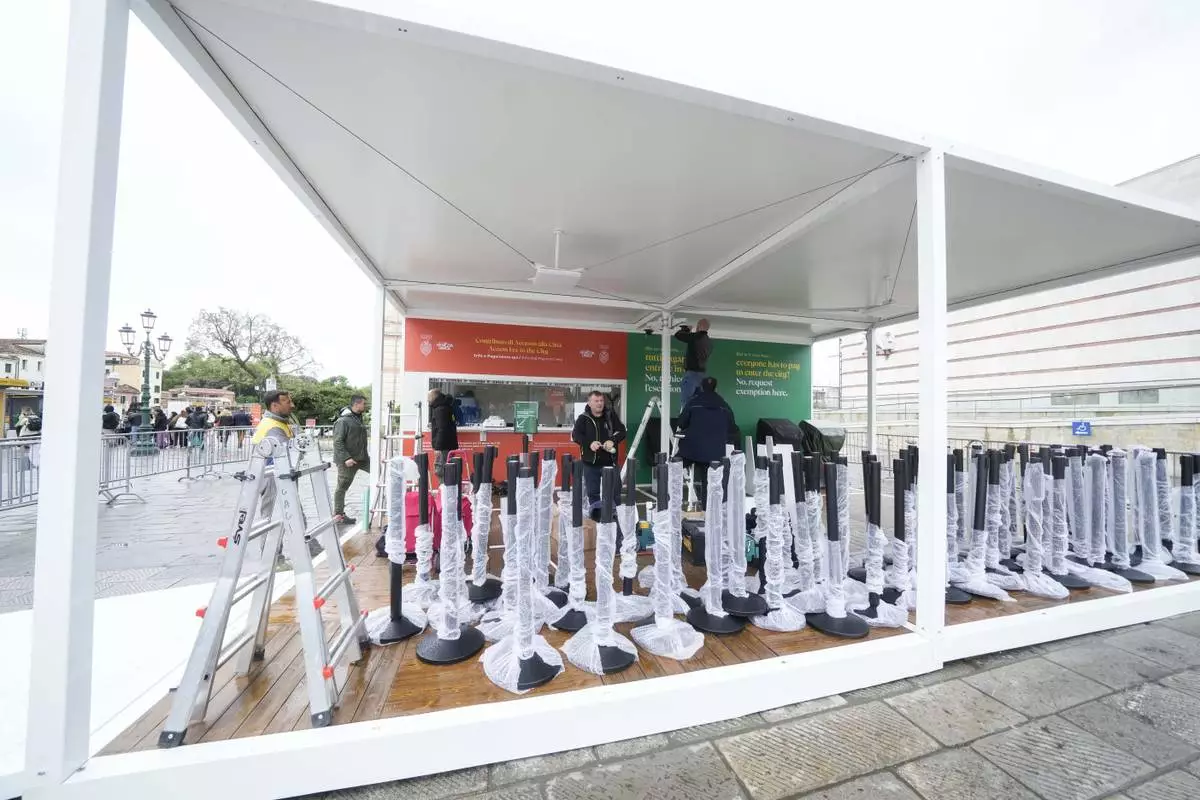
Workers prepare the tourist tax cashier desks outside the main train station in Venice, Italy, Wednesday, April 24, 2024. The lagoon city of Venice begins a pilot program Thursday, April 25, 2024 to charge daytrippers a 5 euro entry fee that authorities hope will discourage tourists from arriving on peak days. Officials expect some 10,000 people will pay the fee to access the city on the first day, downloading a QR code to prove their payment. (AP Photo/Luca Bruno)
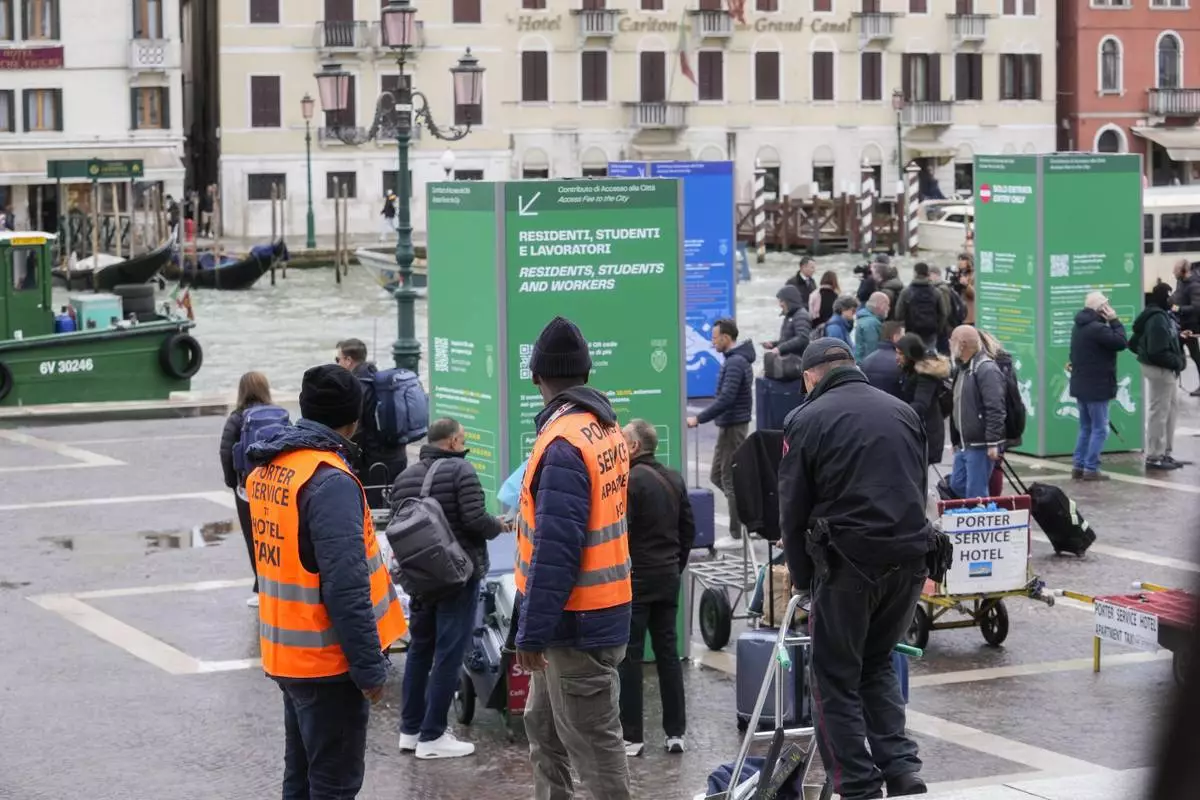
Porters wait for tourists outside the main train station in Venice, Italy, Wednesday, April 24, 2024. The lagoon city of Venice begins a pilot program Thursday, April 25, 2024 to charge daytrippers a 5 euro entry fee that authorities hope will discourage tourists from arriving on peak days. Officials expect some 10,000 people will pay the fee to access the city on the first day, downloading a QR code to prove their payment. (AP Photo/Luca Bruno)
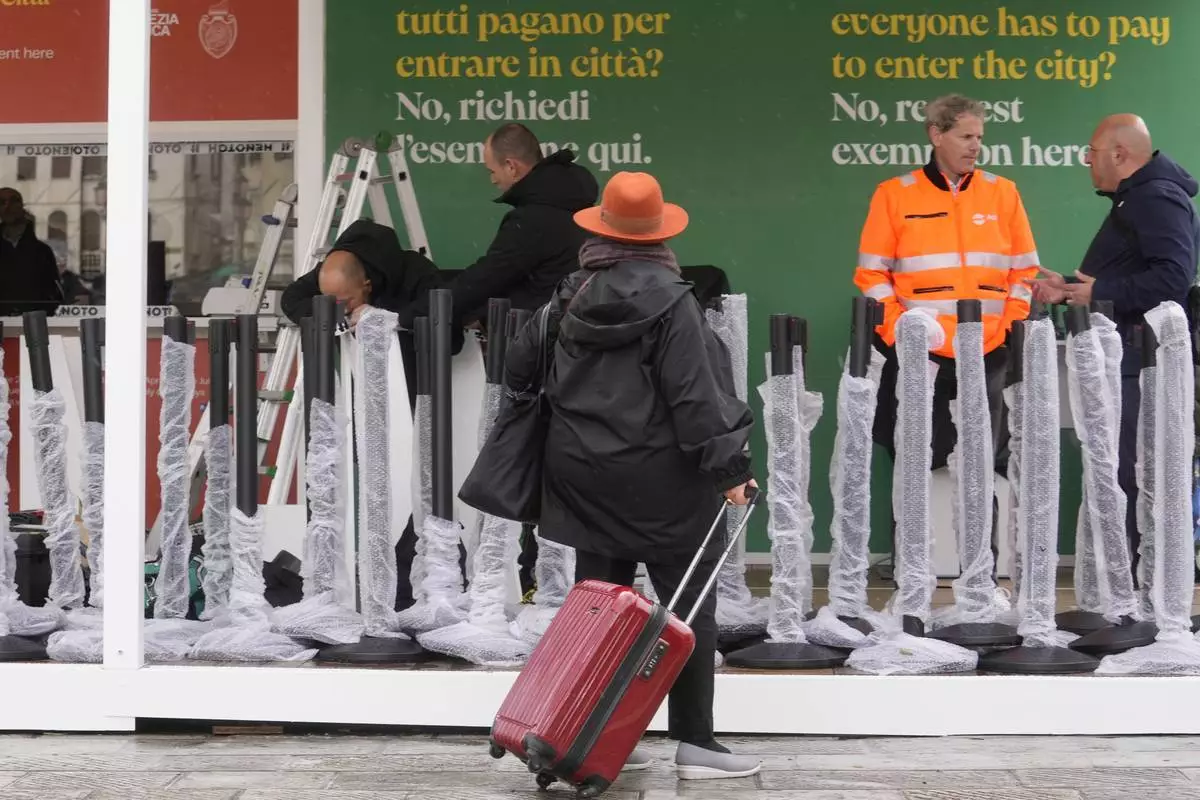
Workers prepare the tourist tax cashier desks outside the main train station in Venice, Italy, Wednesday, April 24, 2024. The lagoon city of Venice begins a pilot program Thursday, April 25, 2024 to charge daytrippers a 5 euro entry fee that authorities hope will discourage tourists from arriving on peak days. Officials expect some 10,000 people will pay the fee to access the city on the first day, downloading a QR code to prove their payment. (AP Photo/Luca Bruno)
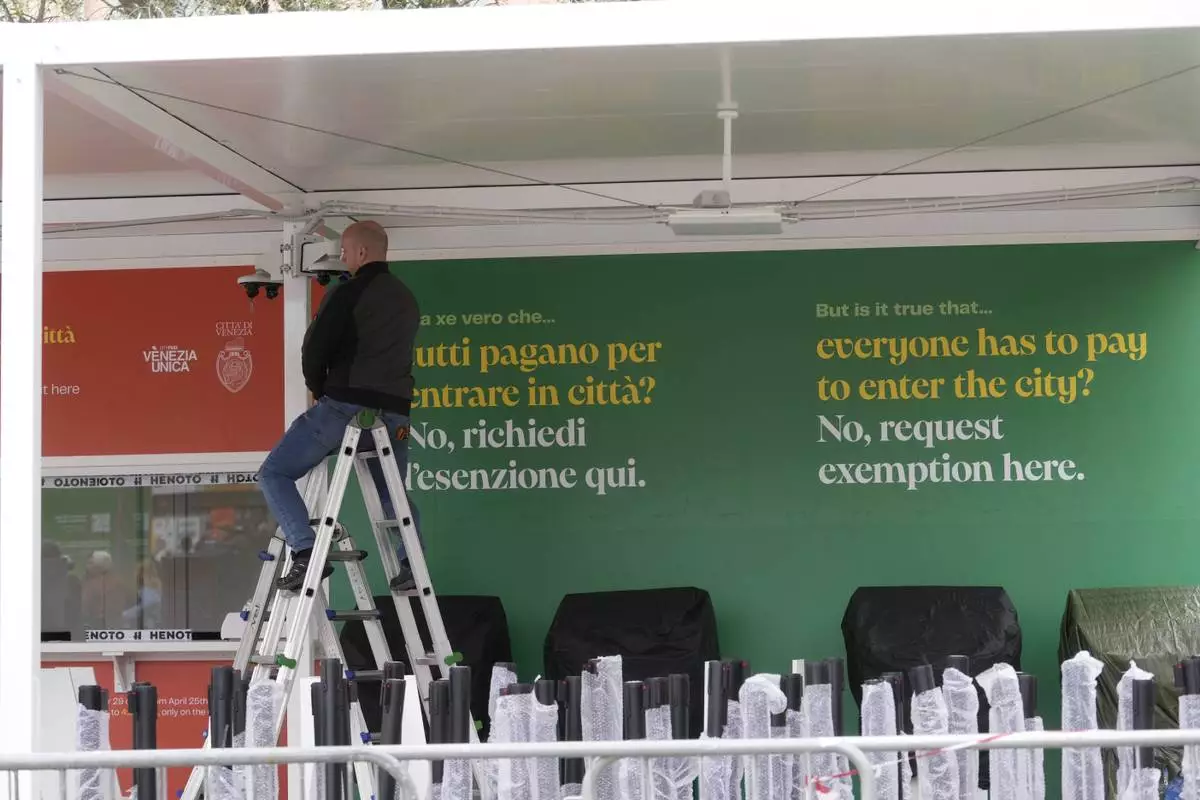
Workers prepare the tourist tax cashier desks outside the main train station in Venice, Italy, Wednesday, April 24, 2024. The lagoon city of Venice begins a pilot program Thursday, April 25, 2024 to charge daytrippers a 5 euro entry fee that authorities hope will discourage tourists from arriving on peak days. Officials expect some 10,000 people will pay the fee to access the city on the first day, downloading a QR code to prove their payment. (AP Photo/Luca Bruno)
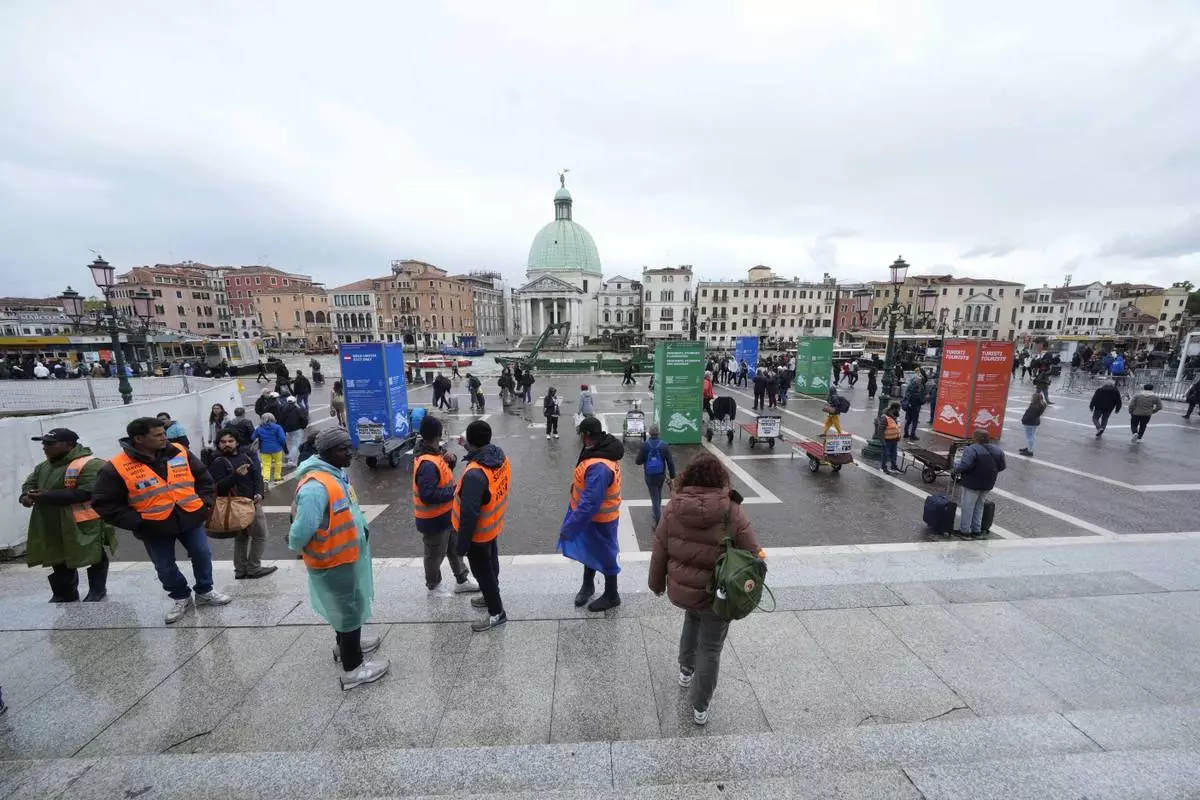
Porters wait for tourists outside the main train station in Venice, Italy, Wednesday, April 24, 2024. The lagoon city of Venice begins a pilot program Thursday, April 25, 2024 to charge daytrippers a 5 euro entry fee that authorities hope will discourage tourists from arriving on peak days. Officials expect some 10,000 people will pay the fee to access the city on the first day, downloading a QR code to prove their payment. (AP Photo/Luca Bruno)
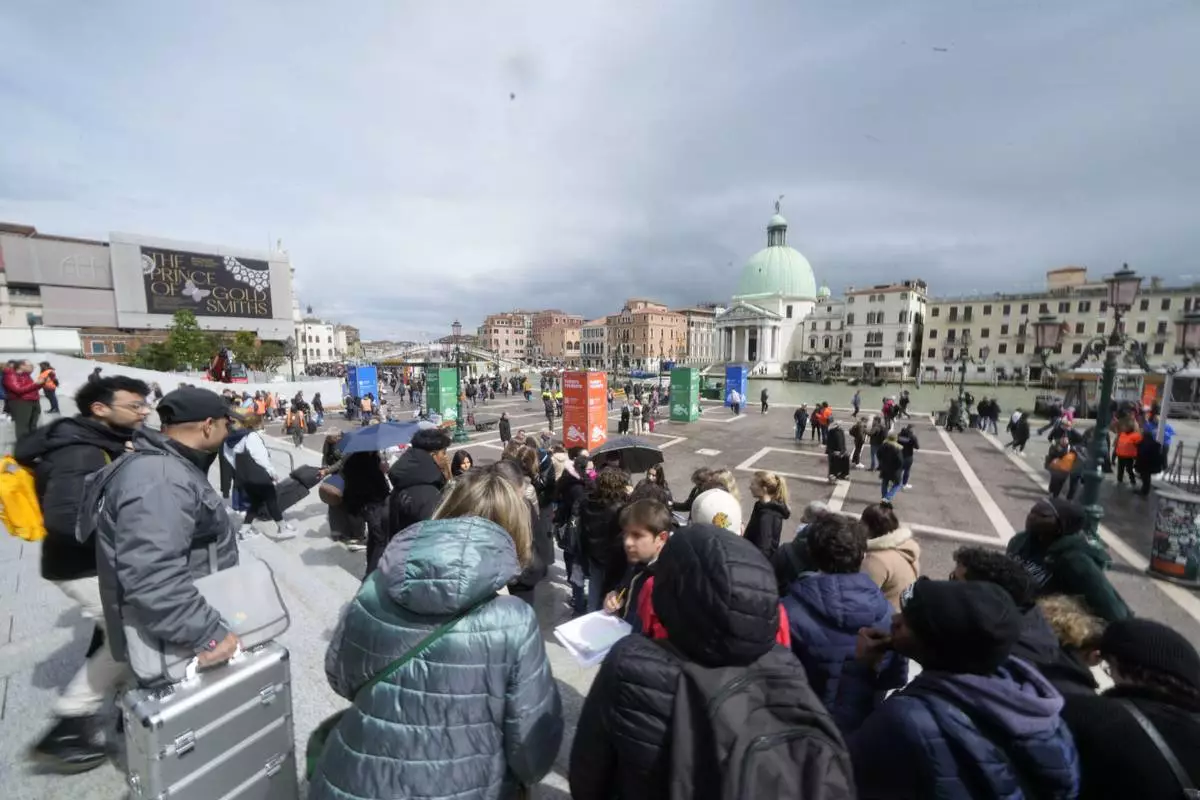
Tourists arrive outside the main train station in Venice, Italy, Wednesday, April 24, 2024. The lagoon city of Venice begins a pilot program Thursday, April 25, 2024 to charge daytrippers a 5 euro entry fee that authorities hope will discourage tourists from arriving on peak days. Officials expect some 10,000 people will pay the fee to access the city on the first day, downloading a QR code to prove their payment. (AP Photo/Luca Bruno)
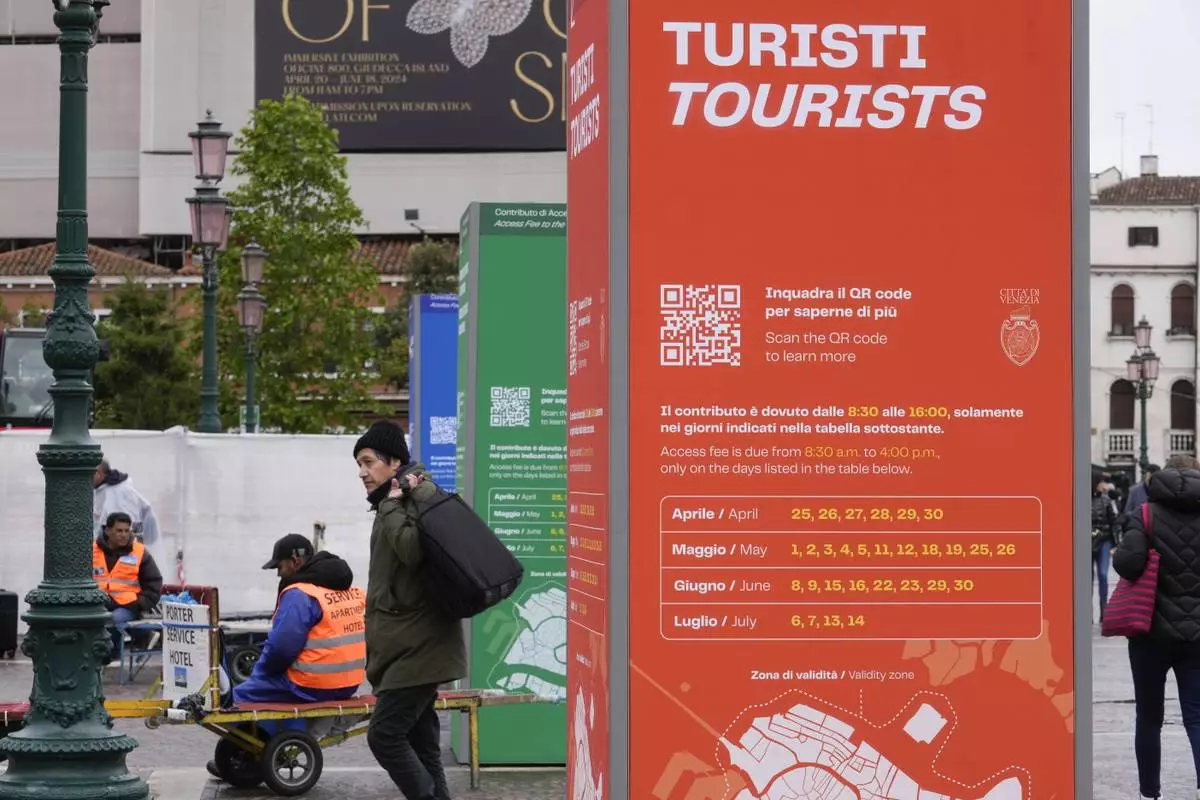
Tourist information boards are seen outside the main train station in Venice, Italy, Wednesday, April 24, 2024. The lagoon city of Venice begins a pilot program Thursday, April 25, 2024 to charge daytrippers a 5 euro entry fee that authorities hope will discourage tourists from arriving on peak days. Officials expect some 10,000 people will pay the fee to access the city on the first day, downloading a QR code to prove their payment. (AP Photo/Luca Bruno)
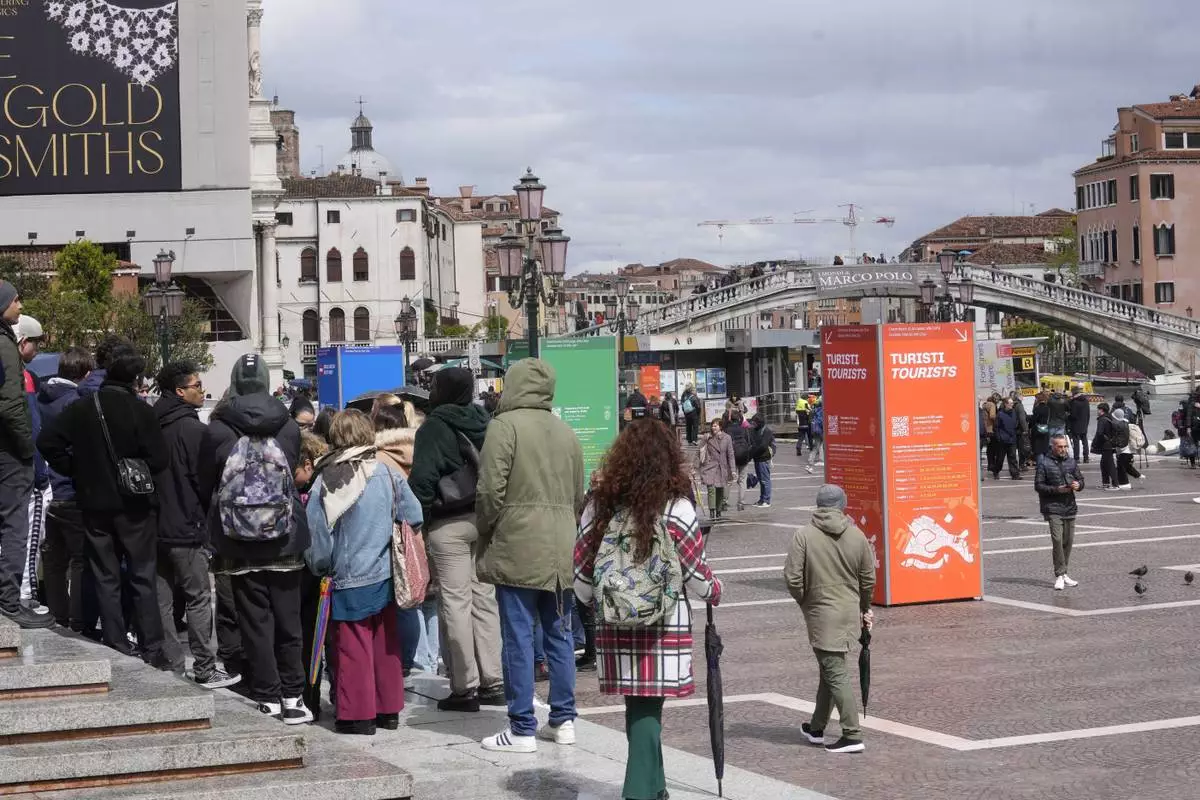
Tourists arrive outside the main train station in Venice, Italy, Wednesday, April 24, 2024. The lagoon city of Venice begins a pilot program Thursday, April 25, 2024 to charge daytrippers a 5 euro entry fee that authorities hope will discourage tourists from arriving on peak days. Officials expect some 10,000 people will pay the fee to access the city on the first day, downloading a QR code to prove their payment. (AP Photo/Luca Bruno)































